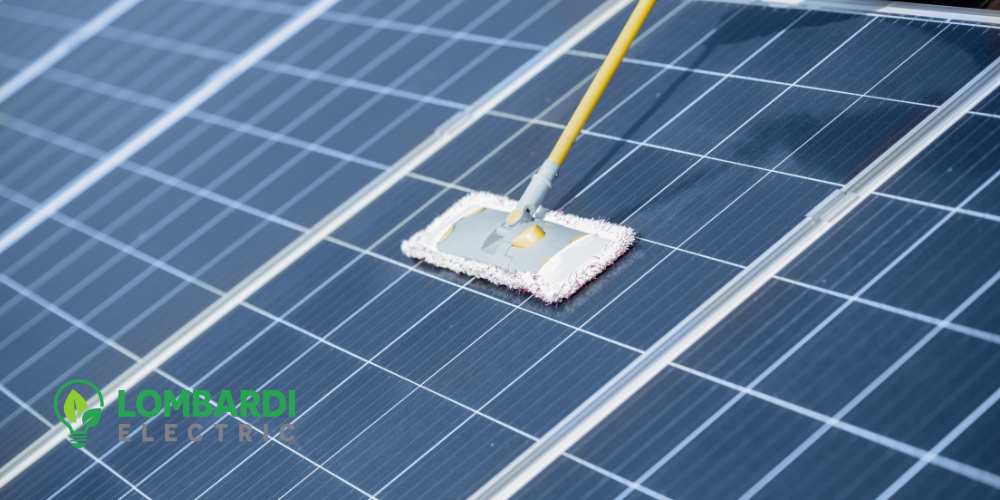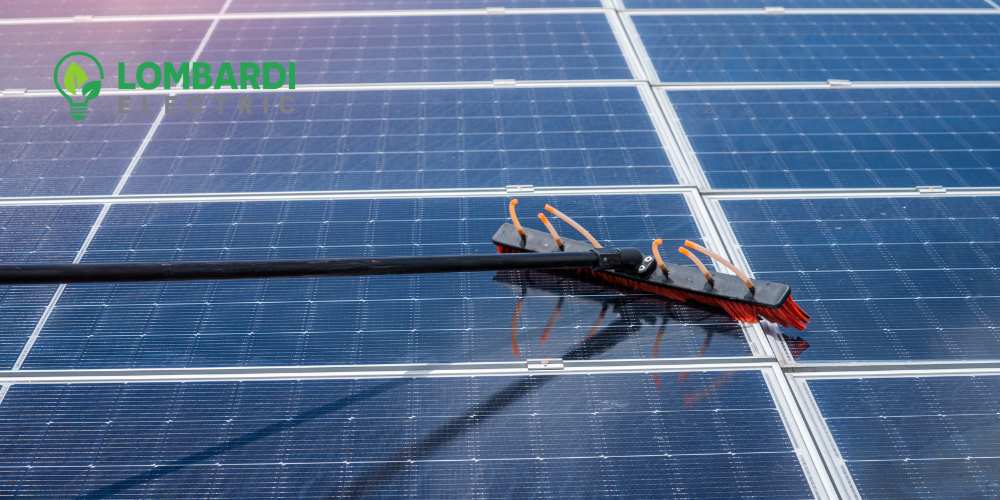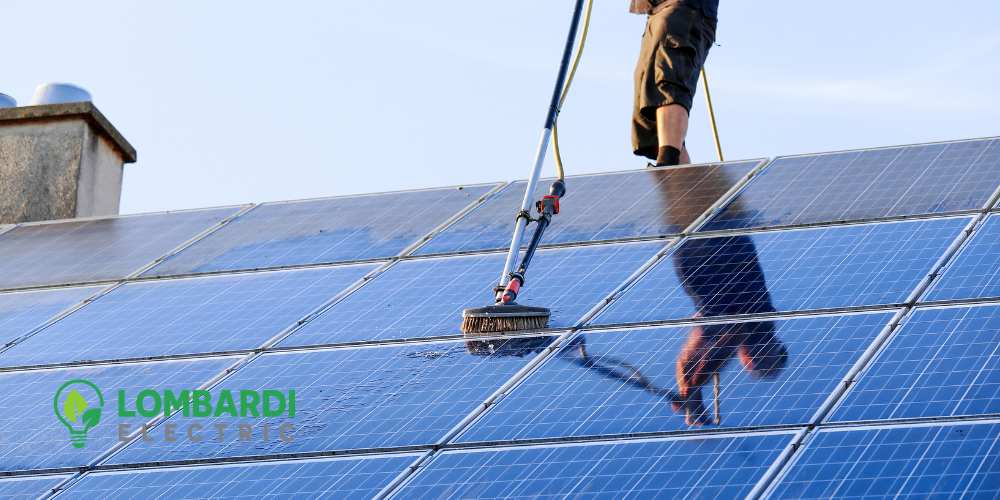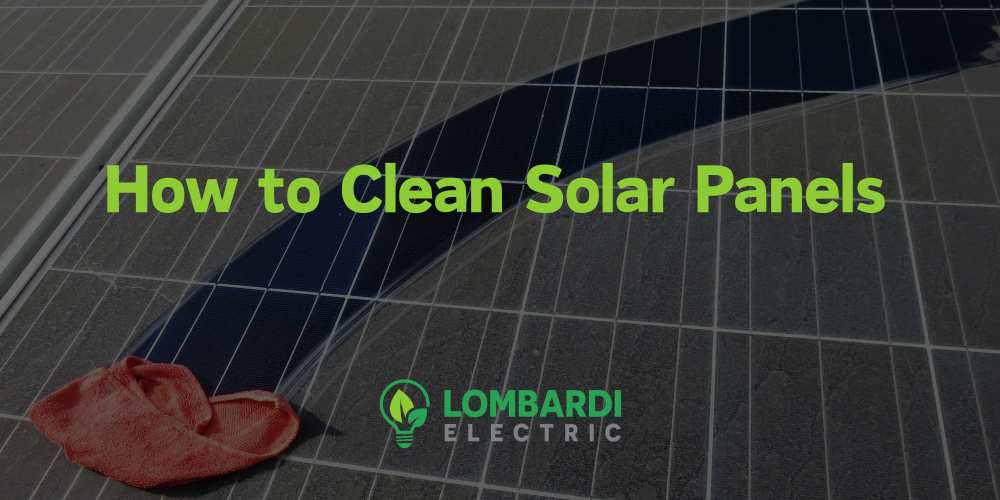In the pursuit of maximizing energy efficiency and prolonging the lifespan of your solar panels, regular maintenance is key to ensuring maximum efficiency, and solar panel cleaning is a crucial aspect often overlooked. At Lombardi Electric, our Alexandria solar panel experts understand the significance of ensuring your solar panels operate at peak performance and explain how to clean solar panels.
Cleaning solar panels’ surfaces effectively involves gentle methods to avoid damaging the panels while you remove dirt, dust, and other debris that may hinder direct sunlight absorption for renewable energy. Regular cleaning, especially in dusty or areas with high mineral deposits, can significantly enhance the panel efficiency and energy output of your solar energy system, ensuring you reap the full benefits of clean, sustainable power for years to come.
If you’re looking to buy solar panels in Louisiana don’t hesitate to reach out.
At Lombardi Electric, we offer:
- Alexandria solar panel installation
- Alexandria solar panel maintenance
- Alexandria solar repair
- Alexandria solar inspections
Call Lombardi Electric today at 318-545-7575 to ensure your solar panels are in their best condition, ready to power your home or business with clean, sustainable energy.
Do Solar Panels Need to Be Cleaned?
Solar panels need to be cleaned. Solar panel performance hinges on the ability to convert sunlight into usable energy. Any obstruction hitting the solar panels can cause them not to perform at maximum efficiency.
Dust, pollen, bird droppings, and leaves are common culprits that can accumulate on the panel’s surface and decrease overall solar output. If you have left on your solar panels, this will attract birds and lead to more bird droppings over time.
Solar panel cleaning is essential, as any amount of dust or other debris can significantly affect solar panel performance. Studies conducted by the National Renewable Energy Laboratory have highlighted that minor obstructions can lead to a reduction in solar panel efficiency by up to 7% compared to clean solar panels.
This decrease not only affects the solar output but can also lead to a noticeable difference in the overall effectiveness and solar energy costs. Therefore, solar panels need to be cleaned from such debris to ensure their usable energy production capabilities are optimized.
Best Way to Clean Solar Panels

Cleaning solar panels is not just about maintaining their efficiency; it’s also about preserving their condition and extending their lifespan. Here’s a step-by-step guide to the basic solar panel cleaning process.
Gather Cleaning Supplies and Materials to Clean Solar Panels
Before you begin, it’s important to have the right tools and materials on hand to keep your solar panels clean. You’ll need:
- A soft brush or a non-abrasive soft sponge
- An extension pole to be able to reach across the entire panel
- A squeegee with a plastic blade
- A garden hose or distilled water
- A bucket of warm water
- Mild dish soap or solar panel cleaning solution
Avoid using harsh chemicals (such as dish soap with micro exfoliants or cleaning solution with bleach) or abrasive materials that could scratch the panel’s surface.
Turn Off Solar Panel System
To safely access your solar panel system, you’ll want to turn it off before you clean solar panels. This will prevent any electrical accidents and ensure that you can save money and work safely to keep the solar panels clean without the risk of electric shock and electrocution.
Rinse Off Solar Panels
Begin by gently rinsing the solar cells with a garden hose to remove loose dust build-up, dirt, bird droppings, and debris. A soft stream of water is usually sufficient to create loose connections and dislodge most of the surface dirt. Avoid using high-pressure water jets, as they can damage the panels.
Apply Cleaning Solution and Wipe Down the Panels
If the solar panels are particularly dirty, you can use a bucket of warm water with a small amount of mild dish soap. Dip your soft brush or non-abrasive sponge into the solar power cleaning solution and gently scrub the surface of the solar panels. Be careful not to apply too much pressure, which could scratch the panels.
Rinse Off the Panels
After scrubbing the solar panels clean, thoroughly rinse the panels with the garden hose to remove any dish soap or solar panel cleaning solution residue. It’s important to ensure that no soap film is left on the panels, as this can attract more dirt. Be sure to remove excess water from the panels with a squeegee or a soft cloth when you’re done.
How to Clean Solar Panels on Roof

If you need to know how to clean solar panels on the roof, here’s how:
To clean panels mounted on a roof, you should use the same materials and method described previously: gently clean solar panels with a soft brush, mild dish soap or cleaning solution, and cold water. The primary difference in this scenario is the necessity of using an extension ladder to access the rooftop panels.
Safety precautions are of the utmost importance, so it’s crucial to have someone securely holding the base of the extension ladder while you go up and down. Additionally, wearing non-slip footwear and a hard hat can significantly reduce the risk of accidents.
However, if the thought of climbing to rooftop heights is daunting and you have concerns about your ability to clean your solar panels safely, it’s smart to hire professional cleaning companies to clean solar panels.
Alexandria solar panel experts at Lombardi Electric offer professional cleaning services and solar panel maintenance. We can efficiently and safely clean your rooftop solar panels, ensuring they operate at their optimal performance level without any risk to your well-being.
Do’s and Don’ts of Cleaning Solar Panels
While the cleaning process of solar panels is often straightforward and can typically be managed without the need for professional cleaning services, it’s not uncommon for individuals to be uncertain about the most suitable cleaning materials or the most effective and safe cleaning methods. Lombardi Electric is committed to guiding you through this process, offering expert advice on top dos and don’ts for cleaning solar panels to encourage more frequent cleaning.
How do you clean your solar panels? Do:
- Clean your solar panels during the early morning or late afternoon to avoid hot panels and potential burns.
- Use deionized water for rinsing if your area has hard water to prevent mineral buildup.
- Inspect your panels’ surface regularly for any signs of damage.
How do you clean your solar panels? Don’t
- Use abrasive sponges or harsh chemicals that can damage the solar panels.
- Use a pressure washer. Pressure washers can significantly damage the panels by causing them to crack.
- Clean the panels during peak sun hours, as this can create temperature differences that may damage the panels.
- Don’t use strong chemicals on the glass surfaces of the panels because this can also damage them.
- Clean or touch the underside of the solar panels.
- Attempt to clean rooftop panels without proper safety considerations and solar panel cleaning equipment.
- Use cold water on hot panels because this can cause them to crack.
How Often to Clean Solar Panels

Solar panels are generally low-maintenance devices; they only need regular cleaning every month or so or after a major weather event. How often you should clean your solar panels depends on several factors, each playing a role in the rate of dust and loose debris accumulation:
- Geographic Location: Certain areas are prone to accumulate dust, pollen, or industrial particulates, leading to quicker buildup on panel surfaces. Solar panels in areas like this may need more frequent cleaning compared to other areas.
- Landscaping: Homes or businesses with agricultural fields or trees nearby may experience more frequent debris from leaves, pollen, or farming dust settling on the panels. Solar panels need cleaning more frequently if they are surrounded by agricultural fields.
- Pitch of the Roof: Steeper roofs may naturally allow more debris to slide off, whereas panels on flat roofs can accumulate particulates more readily.
Considering these factors can help determine an appropriate cleaning schedule to maintain optimal panel efficiency. An annual inspection of your solar panels with a solar expert can also help you come up with a regular cleaning schedule to ensure maximum energy output.
Solar Panel Cleaning Cost in Alexandria
The cost of cleaning solar panels can vary depending on the size of your solar panel system, its accessibility, and the level of dirt buildup. Hiring a cleaning service for your panels is the cheapest part of investing in a solar energy system. If you’re wondering, how much do solar panels cost? Reach out to Lombardi Electric for more information.
Generally, you can expect prices from professional cleaning companies to range from $150 to $300, or about $25 per panel.
Our Alexandria solar company offers competitive pricing for solar panel cleaning services and solar panel maintenance, ensuring your system operates efficiently without breaking the bank.
Alexandria Solar Panel Cleaning Service
If your solar panels need cleaning or you’re unsure about the best approach to maintain their efficiency, Lombardi Electric is here to help. Our team of solar experts in Alexandria, LA, is equipped with the knowledge and tools necessary to provide professional solar panel cleaning in Alexandria. We also offer regular solar system maintenance, ensuring your system operates at peak performance and energy costs stay low.
Whether your solar panels are ground-mounted or installed on a rooftop, as an Alexandria commercial solar company and residential solar company, we can handle the job safely and effectively.
Don’t let dirt and debris compromise your solar panels. Contact Lombardi Electric today at 318-545-7575 for professional cleaning or to learn more about our comprehensive solar panel services, including installation, maintenance, and repair. Let us help you maximize the benefits of your renewable energy so that you can reap the benefits of solar energy for years to come.
